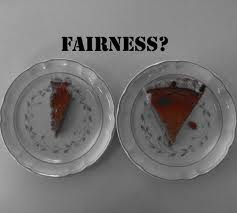In Relationships, Equity is Key
In interpersonal communication research there is a theory called Equity Theory that explains relational satisfaction in terms of fair and unfair distribution of resources within relationships.
In a healthy relationship there are always ebbs and flows.
This means that at times I will give more to my partner and receive less and vice-versa. This can be manifested in all kinds of emotional and physical types of treatment. The equity can swing back and forth but it has to find balance eventually for a relationship to be healthy. When one side of a relationship is doing all of the giving and the other side is doing all of the taking, this results in an inequitable relationship, which leads to relationship erosion. Think about this teeter-totter being stuck like this. This would not be any fun.
You might assume that it would actually be better to receive more of the benefits from the relationship. The problem is that after a while you begin to feel guilty and unbalanced in the relationship. This leads to problems in the relationship. In the reverse, if you feel like you are doing most of the sacrificing in the relationship you might assume that this will help build a better relationship. In reality, you are overburdened and you will develop feelings of resentment toward your relationship and partner.
In order to keep a good balance, communication and effort are key. You can talk about your awareness of inequity in your relationship. You can ask for change which will lead to more balance. If someone is doing most of the giving, for example, make sure to acknowledge it and work toward balance (i.e., giving your partner a night off or a weekend. It is important to remember that your relationship is not always going to be equitable–ebbs and flows are natural. But fairness is critical!
John Stacey Adams, a workplace and behavioral psychologist, was the first to develop this theory in 1963. His research focused on employee satisfaction. He argued that employees seek to maintain equity between the inputs that they bring to a job and the outcomes that the receive from it against the perceived inputs and outcomes of others (Adams, 1965). The belief is that people value fair treatment which causes them to be motivated to keep the fairness maintained within the relationships of their co-workers and the organization.
Just like in the workplace, in relationships people value fair treatment which will lead to motivation to keep fairness maintained within the relationship.
There is a picture book called, “This plus That,” by Amy Krouse Rosenthal. It is about life’s little equations. Some of her equations are:
Blaming + eye rolling (doesn’t equal) sincere apology ”I’m sorry” + hug = sincere apology Good days + Bad Days = Real Life Once upon a time + Happily Ever After = Pretend .
What we learn from this is that good days and bad days are part of real life! Also, sincere apologies can help. One way we to have more good days is by working toward equity in our relationships.
It will benefit everybody!








I couldn’t agree more. I was once in a relationship where I felt like I was constantly giving and getting nothing in return needless to say the relationship did not last long because of this and other reasons. Equity is definitely key to a relationship and without it the relationship will not work very well. Someone can only give so much without getting anything in return.
I have been in a relationship where I was receiving and not giving back, this ended up not in a good way. I didn’t really realize what I was doing until it happened to be too late and they moved on from what was going on. But I also have been in a relationship where I was trying to give it a lot and I ended up getting nothing in return so I canned that.
It’s hard to find a balance sometimes.